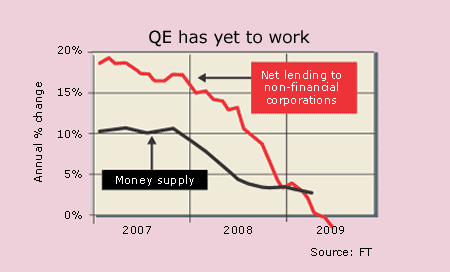
Britain’s “sanguine summer has suddenly turned unsettled”, said Ian Campbell on Breakingviews.com. “Not for the first time, the Bank of England has changed the weather.” Optimistic markets were rattled when it announced an extension to its quantitative easing (QE) programme – injecting money to bolster the economy by buying gilts and corporate bonds – from £125bn to £175bn.
This is needed to ensure that inflation rises to the target rate of 2% in the medium term, said Governor Mervyn King. He added that while growth looked set to resume, the recovery will be “fragile” and we will “find ourselves in a difficult position for a long time to come”. Enter the latest greater-than-expected jump in the unemployment rate, to a 13-year high of 7.8%, which Howard Archer of HIS Global Insight deemed “ghastly”.
What the commentators said
The Bank is worried that without QE there could be a deflationary spiral as plummeting housing wealth, falling incomes and rising unemployment intensify the deep recession, said Larry Elliot in The Guardian.
But its attempts to spur bank lending through QE have had scant impact as banks – wary of future losses – continue to hoard cash. The measure of the money supply the Bank watches to see if QE is kicking in remains weak, said Roger Bootle of Capital Economics, while the non-financial sector is paying back more than it’s borrowing (see chart).
In which case, will more cash help? The Bank, after all, “can’t make banks lend or people spend”, said Campbell; demand for credit isn’t exactly soaring either. And King himself noted this week that it will “take several years” for banks to repair their balance sheets.
So QE may not avert a deflationary spiral, while the other main worry is that it will pave the way for a sharp eventual rise in inflation if applied for too long. Note that “there are no real examples of it working successfully in taking an economy out of modest deflation into modest inflation”, said Buttonwood in The Economist. Past results have either been failure (Japan) or hyperinflation (Weimar Germany).
In the meantime, there could be more unpleasant side effects. Thanks to QE the Bank owns around 20% of all gilts, which has reinforced the impression that “one of the tacit goals of QE is for the Bank to finance the borrowing of a government that has lost all sense of economy”, said the FT’s Lex.
Fears that the budget gap is being filled with printed money mean that foreign investors would be likely to demand higher interest rates for holding British assets, thus undermining growth. Following the announcement of more QE, the worry is that the economy is “either far worse … than most imagined or will get worse soon”, said Lex. “Possibly both.”